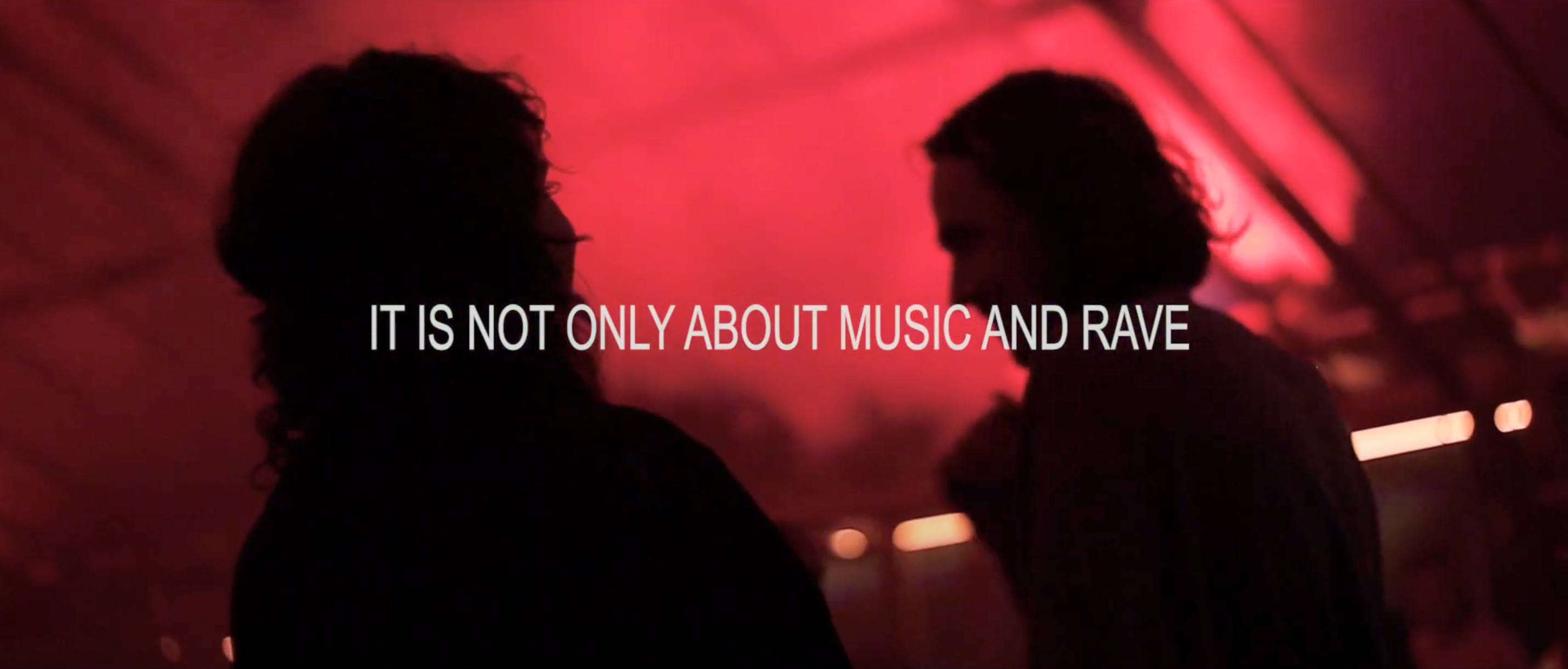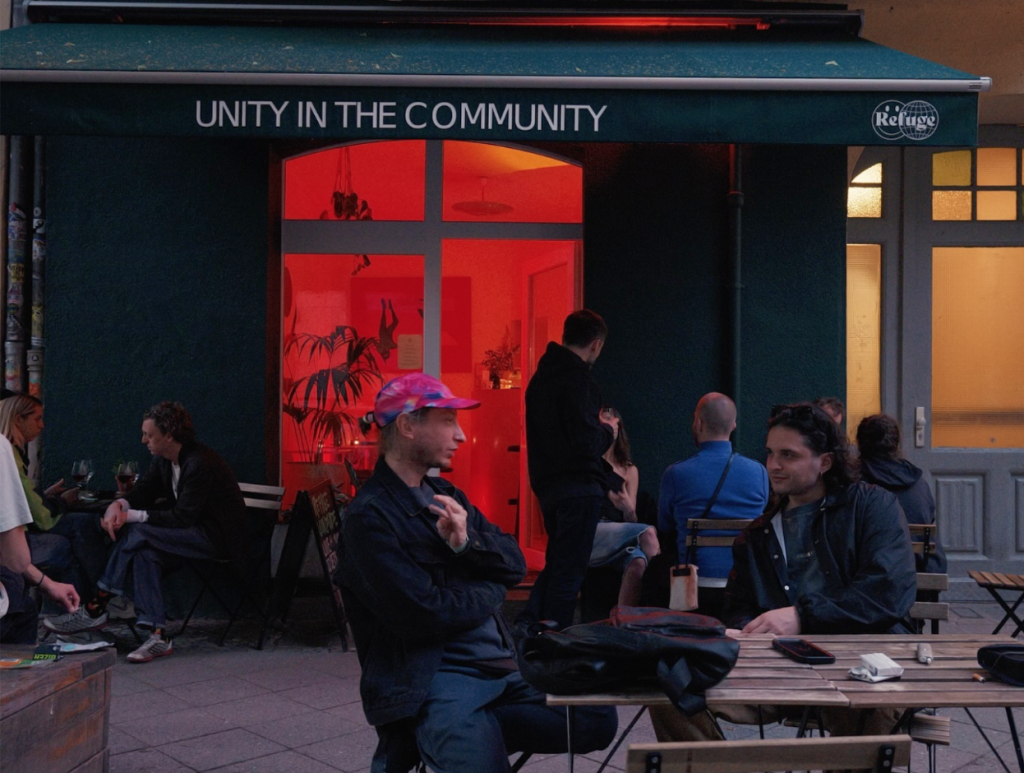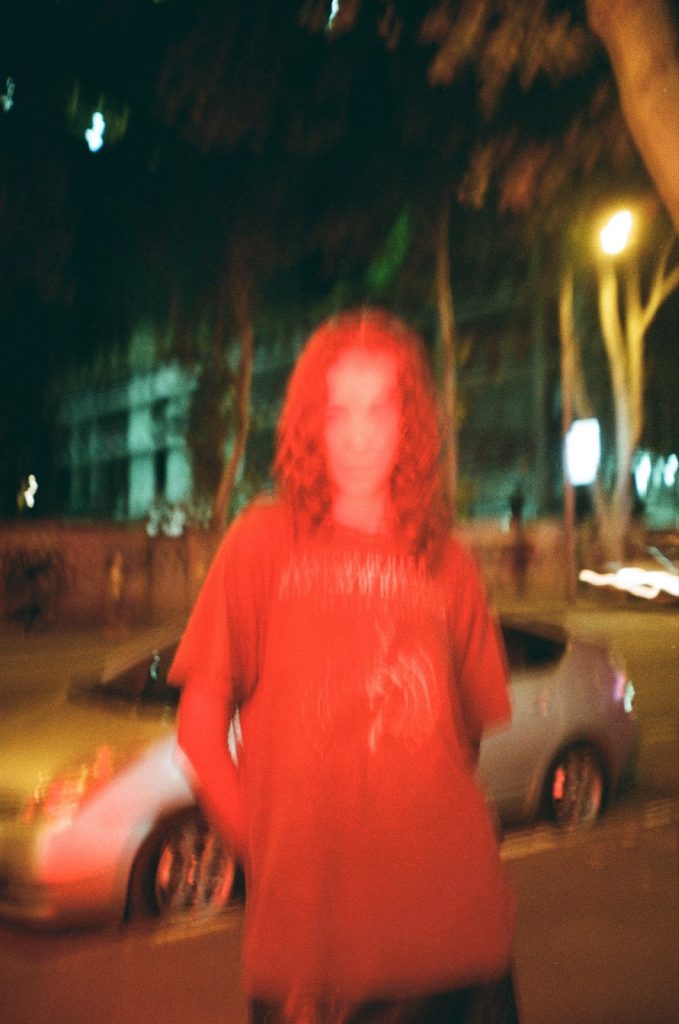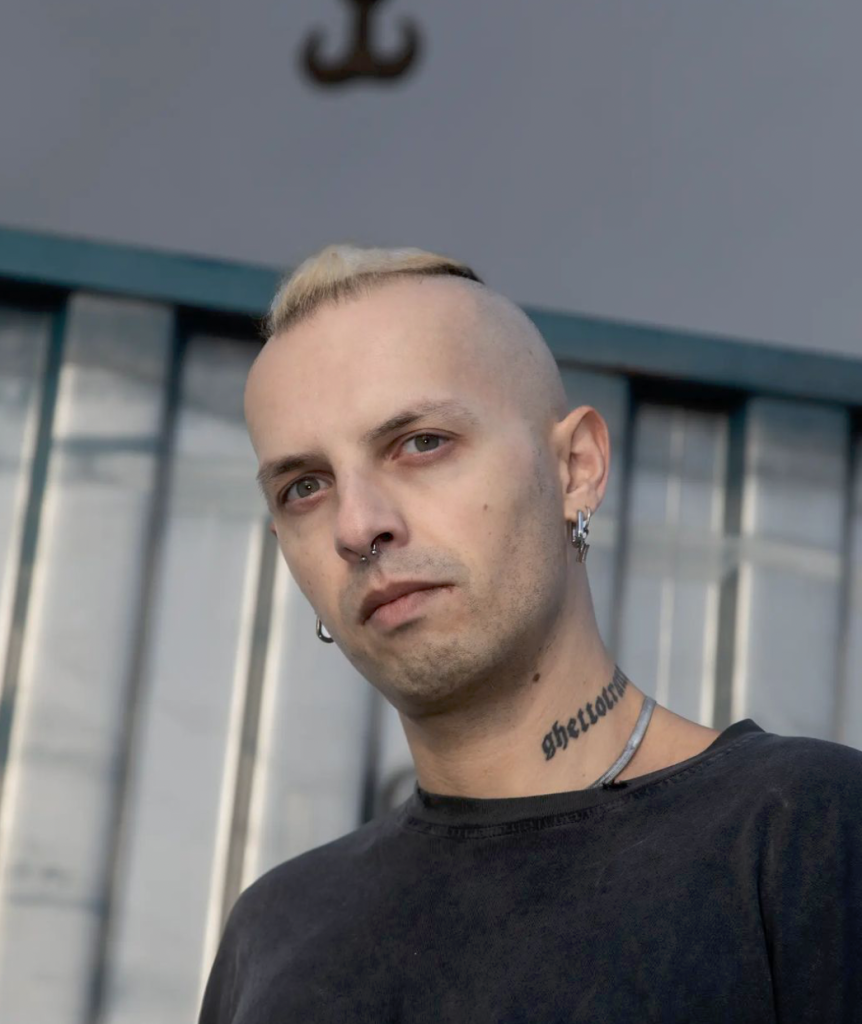Underground Culture Under Threat II. — Nomadic festival ICKPA sparks solidarity and wrestles Westsplaining
Published October, 2024
by Gábor Erlich

In my previous article in this series, I sketched out the burning socio-political context in contemporary Georgia (and the Eastern European peripheries), focusing on the creeping danger of authoritarianism and religious bigotry. This time, I’ll be presenting one of the most exciting collaborative undertakings from the region, ICKPA (spark in Ukrainian), a Kyïv-born festival promoting underground music and culture from Ukraine, Georgia, and beyond.
Attention: ICKPA is coming to Prague and Warsaw on the last weekend of October!
This breathtaking journey began in the outskirts of the Ukrainian capital: ICKPA Kyïv occupied and refitted the large and picturesque ‘Khvylia’, a Soviet sanatorium complex to host the rave of 2021. As David Chikhladze, co-founder of the ICKPA Collective (with Guri Gotsadze and Zviad Gelbakhiani) puts it: “to organise a good party, you have to know how to party well”, and these guys do party well. Three stages blasted stylistically diverse, cutting edge sets at ICKPA Kyïv, the main arena outdoors, providing the heartwarmingly monotonous bass tone, the ‘hothouse’ (an actual greenhouse) spicing it up with voluptuous house, and the underground gym echoed oddball experimental electronica.
As ICKPA team member Kirill Nilsson put it, “the main drive was to create something new, not just a music festival, but a phenomenon that can gather Ukrainians, Georgians and people from all over the world in Kyïv, in a very special place around music, educational and political discussions, art installations and even queer cabaret”.
Crucially, ICKPA, since its inception, has always been a whole lot more than ‘just’ a party, in that all the events are truly cross-disciplinary endeavours. Apart from the entire location looking like a large-scale trippy installation, a queer cabaret took place in the sanatorium’s theatre (the stage of which was certainly used for vastly different performances in the past), the sports hall was revitalised by a charity soccer tournament between teams representing techno clubs and record labels, and the meeting room hosted talks, discussions, and roundtables.
The three organisers I spoke to, Zviad Gelbakhiani (who is also a co-founder of the iconic Tbilisi club, Bassiani, which celebrated its tenth birthday recently), Kirill Nilsson (a promoter and organiser of Swedish and Ukrainian venues, most recently co-founder of 400° in Kyïv), and David Chikhladze all agreed that ICKPA was a “very Kyïv thing” that was supposed to grow with and grow even closer to the already tight-knit community of the Ukrainian capital.
As Kirill recounts, “the most memorable moments were probably those first seconds after the last DJ played the final track, when we realised that we all actually did it, that we created something really special and it’s just a beginning”.
Yet, the start of Russia’s full-scale war against Ukraine forced not only most of the organisers, but a significant part of the community to drastically change directions. Some left Ukraine, while others stayed in the country and are participating in the war effort in a multitude of ways – hence ICKPA, this sizzling spark, has turned into a nomadic venture.
As Zviad told me, “ICKPA, since its foundation, has been rooted in the principles of solidarity among people. Following the invasion, this mission became even more vital, especially in cities where a louder and more assertive voice was needed”. It is as clear from this answer as it is from the programming of the international events that the organisers believe that ICKPA is never just a party, but it always seeks to shake up artistic boundaries, theoretical limits just as much as it strives to move bodies. To recall David’s words: “we should be a strong community first, bound together, and then, our dance will be completely different”. In this vein, ICKPA has set roots in Berlin and NYC too, and is about to conquer our region with two events in Prague and Warsaw on the 25th and 26th of October!
Berlin seems to be emerging as the new, temporary hub for the festival: this past June, ICKPA returned to the infamous city of electronic music to show, once again, something new/something more to the German capital.
The festival started with a radio takeover on the frequencies of Refuge Worldwide with four sets by six artists.

Once warmed up, the next day was dedicated to the discursive arts, namely two panel discussions and a screening. The first panel, co-curated by Dato Laghidze and the author, in conversation with Mariia Beburia and Irine Beridze, grappled with the elusive notion of Europe from an anti-Westsplaining perspective to reveal the interconnectedness of the peoples’ histories in the region, and, importantly, to widen the paths of collaboration between artists/activists/scholars from the illiberal laboratories of Eastern Europe. The second act, curated by Michał Murawski, featured presentations from and a discussion amongst Asia Bazdyrieva, Olexii Kuchanskyi, Evelina Gambino, and David Chikhladze; focusing on the devastation caused by Russia’s war on Ukraine (its built, human, and nonhuman infrastructures) as well as on the ways in which rebuilding the war-thorn frameworks based on radical scholarship and activism will lead to a more just future. Given that RSO.Berlin is somewhat far from the centre, it was a pleasant surprise to see so many interested and engaged people in the audience on a summer Thursday evening. It also supports the organisers directive to inhabit Berlin as a temporary base, for the city is already a hub for Eastern European dissidents. The second day was brought to an end by a screening of Tekla Aslanishvili and Evelina Gambino’s experimental documentary, “A State in a State”, scrutinising the dis/functioning of the rail network of the South-Caucasus.
Though the political and activist edge of the festival is palpable not only during the day of discussions, it envelops ICKPA as such. Zviad Gelbakhiani summed up the key reasons behind this politically loaded raving as follows: “Playing at ICKPA on the international level means standing against oppression, slaughter, and occupation. Fortunately, we’ve found that artists are eager to perform at our events. Indeed, we find ourselves in a world, particularly in our own countries, where we still continue to navigate the lingering remnants of imperial legacies. The current circumstances surrounding us and our friends transcend ordinary, daily lives, far beyond the confines of mere work or occupation.”
While David Chikhladze talks about “infrastructures of dancing” as a vehicle of social unrest and social change, inasmuch as the communities forged together in the nonconformist scenes of club-culture result in a togetherness that will never accept chauvinism and bigotry, on the contrary, will always stand together against oppression.
To say the least, these novel infrastructures of dancing are being built around the world from Eastern Europe, of which ICKPA in Berlin this summer was an extraordinary display, thanks to selectors such as Nastya Muravyova, Nina Farrina, Supergloss, Seqta, Nastya Vogan, Nebbieri, Resom, or Dali, to name a few.
But what connects a Kyïv-born nomadic festival to the political struggles of Georgia, you might ask. More than what you’d first imagine. To state the obvious, both Ukraine and Georgia have existed under the colonial imperialist project of the Russian Empire for centuries and were also forcefully ‘integrated’ into the Soviet Union (1921, 1922). The period following the collapse of the SU was nothing like the so-called velvet revolutions of East-Central Europe, and even more importantly, these countries remain in the ‘sphere of interest’ of the neo-imperial Russian Federation which has repeatedly suppressed the countries’ right to self-determination. While we’re all familiar with Russia’s current, full-scale invasion of Ukraine (2022-), it is important to remind ourselves that this war started back in 2014, with the annexation of Crimea and the ‘slow-burning war’ in the Donbass. What’s even less remembered is that it was the 2008 Russo-Georgian ‘five-days war’ that served as the blueprint and litmus test for the current stream of Russia’s war. Furthermore, Ukrainians struggled successfully against an authoritarian regime which showed a great deal of similarity to the socio-political struggles Georgians are fighting at this very moment. Since my last article, the parliament in Tbilisi has passed the homophobic legislation (dressed up as a law ensuring the protection of ‘family values and minors’), while authorities doubled down on their insults against civil society organisations critical to the government.
I asked two Georgian DJs whose sets I enjoyed the most at ICKPA Berlin this summer to comment on the situation in their home countries and to share some of their experience of playing at the event.
Dali is a selector whose remarkable taste and drive for experimentation shape the sonic landscape of one of Tbilisi’s newer, but all the more important clubs, Left Bank. Her sets are infused with the very finest energies coming from the myriad genres she feels home at.

G.E.: Dali, how did you like ICKPA Berlin and what was your experience of this international venture that throws a highlight on our region?
Dali: Performing at ICKPA is one of the most important events for me. I’ve visited Kyïv many times, whether for gigs or to catch up with friends, and each visit has been unique. The city and its nightlife had been developing stunningly until the war interrupted at its peak…
Both Ukraine and Georgia face the same struggle: Russia doesn’t allow us to grow and become fully independent. Whenever it sees the power of the people rising, it tries to suffocate that progress…
Despite everything, progress continues, thanks to the resilience and strength of the people in both Ukraine and Georgia. Gatherings like ICKPA are crucial to maintain relationships between countries as we share a common fight against the same oppressor.
G. E.: How do you think your home club, Left Bank, that is more than just a club, and is, in fact, seeking to become one of the hubs for the local progressive youth, is playing a role in the current, scarily grim political climate in Georgia?
Dali: At Left Bank we have a huge feeling of unity and respect for each other.
Every member’s piece of advice matters. Our friendship is so strong that the working process is smooth and enjoyable. Especially when we share common interests it makes it even smoother.
It slowly grew and developed into a strong social space and community. I think people can sense this energy, and it makes spending time at Left Bank even more fulfilling.
However, it’s impossible to separate ourselves entirely from the political landscape. I wish we could, but in a climate like Georgia’s, staying neutral doesn’t make sense. Because the idea of The Club itself stands for equality, security, freedom… Without those principles, we’re just another entertainment venue. Instead, we are a club driven by people and community, advocating for the change we wish to see.

Seqta has been spicing up the booth in Georgia and around the world with his/their insatiable drive to find and put together tunes that result in a queer warp of composition. Currently living in Berlin, they always find a way to play at least a couple of sets in Georgia every year.
G. E.: Seqta, you’ve been around as an active and central figure of the Georgian underground scene for a long while now. How do you feel about the current authoritarian turn in your home country and what do you think the role this community can play is, these days?
Seqta: The situation in Georgia, and around the world, is deeply concerning. We’re seeing multiple invasions happening globally, but Georgia has never given up its fight for freedom. No matter how strong Russia’s influence may seem, we have proven time and again that we can stand even stronger. We won’t allow authoritarianism to shape our politics. The large demonstrations in the spring of 2024 reminded me once more of the power of our people, showing that we will always fight for our rights. LGBTQ+ rights in Georgia remain one of our greatest concerns, and we cannot let any government or right-wing force undo the progress we’ve made in ensuring equality for everyone living in our country. That’s why, despite the challenges, I believe in the resilience and strength of our community. We’ve always been active, standing up for what we believe in. It hasn’t been easy, but we’ve faced tough times before and know how to persevere. This isn’t the first time we’ve encountered difficult leadership, and it likely won’t be the last. Past governments have come and gone, and I’m confident we will overcome this too. Our community plays a crucial role in this fight, and while the situation is hard, I remain hopeful. We’ve faced struggles before, and I trust that same spirit will guide us through once again.
G. E.: You’re based in Berlin, so you did not have to travel much to play at ICKPA, what was your experience, could this nomadic Eastern European festival bring a different energy to a city where, many would say, the biggest issue is the overwhelming variety of cool events?
Seqta: ICKPA has become a fresh and vital voice in the Berlin club scene, and it holds a special place in my heart. After the long lockdown, ICKPA was the first event I attended after a year of isolation, and I still vividly remember the experience. It was incredible to reconnect with old and new friends, all of us meeting at the airport, ready to board a flight to Kyïv. My heart raced as I stepped into the festival territory—it felt like my first big event all over again. It was an unforgettable night and day, where I saw friends from all over the world. ICKPA was one of the first events to reunite everyone after the lockdowns. Sadly, after the full-scale invasion, it couldn’t happen in Kyïv anymore. But I’m so glad that the festival has continued in Berlin, carrying the same spirit. Every time it takes place here, I feel that same excitement, with friends from Georgia, Berlin, and Kyïv. That’s why playing at this festival means so much to me. This year marked my third time performing, and each experience has been incredible in its own unique way. The crowd has always been one of the best you can get in Berlin, which says a lot about the festival’s distinctive vibe. It really has its own niche, its own energy, and sound, which I think is so important. I’m also honored to play at the ICKPA festival in Prague this October, alongside some amazing artists. It’s exciting to see how the festival continues to evolve and expand its reach.
Even though Berlin is famous for its diverse events, sometimes things can start to feel a bit repetitive. That’s why ICKPA is such a breath of fresh air—it brings something truly different to the city.
And the journey continues! ICKPA will teleport itself to NYC in November, after some much needed recovery following Prague and Warsaw. And the organisers are well into the planning of next year’s Berlin events. Yet, we might say, in agreement with Kirill and Zviad, that the single most exciting development is the preparation to return to Kyïv, hopefully in 2025. Stay tuned for more info to come, and join the parties nearest to you!
—
Written by Gábor Erlich.
Lead image: Gasoline production for ICKPA (video still).
—
This article is brought to you as part of the EM GUIDE project – an initiative dedicated to empowering independent music magazines and strengthen the underground music scene in Europe. Read more about the project at emgui.de.
Funded by the European Union. Views and opinions expressed are however those of the author(s) only and do not necessarily reflect those of the European Union or the European Education and Culture Executive Agency (EACEA). Neither the European Union nor EACEA can be held responsible for them.